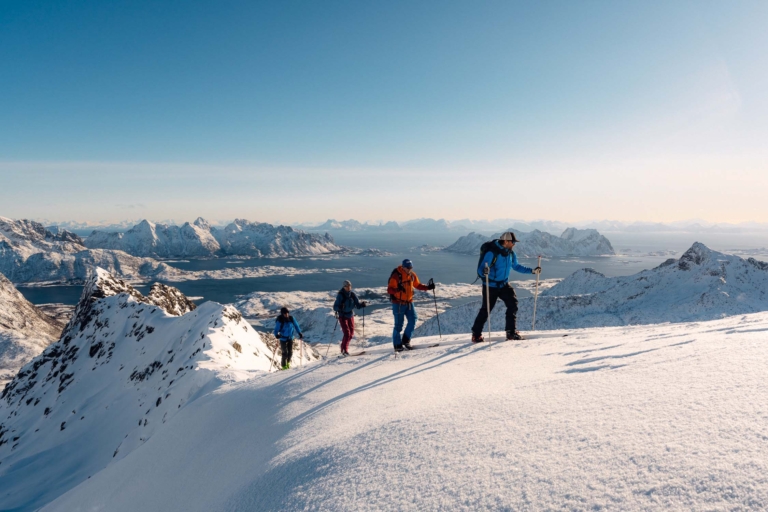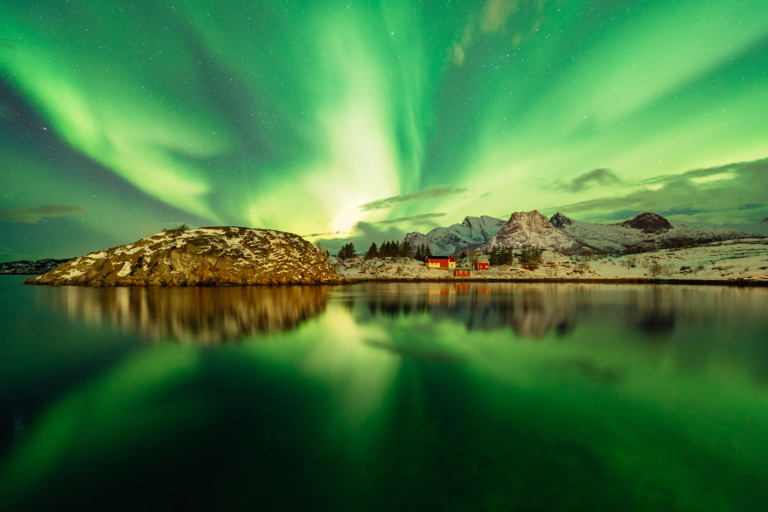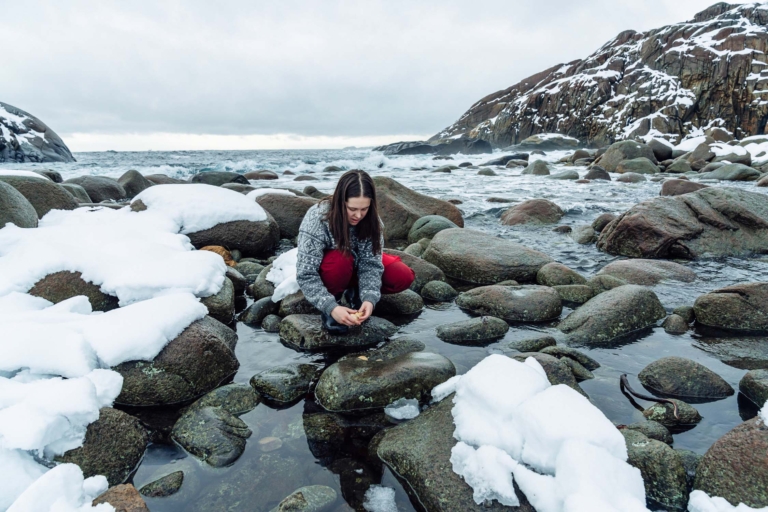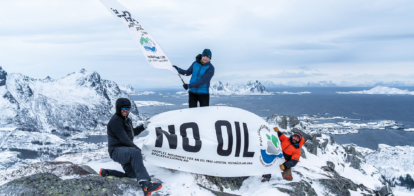Making Oil History
Folkeaksjonen is taking action against petroleum exploration in the Norwegian Sea.
All photos by Johan Wildhagen
In Norway, the welfare state is built on oil. Or so the narrative goes. But according to Daniel Weiss, it’s a common fallacy that Norway’s enviable social-safety net was only made possible by oil extraction.
Daniel is the board leader and a nearly decade-long member of Folkeaksjonen, the people’s action for an oil-free Lofoten, Vesterålen and Senja. Their explicit goal is protecting the waters in and around Lofoten from the environmental dangers posed by offshore drilling. And their success can be a lesson for action in other locales—even on a global scale.
Lofoten, Vesterålen and Senja are island chains off northern Norway. They’re popular tourist destinations—near-vertical peaks rise abruptly from the sea, looming over quaint, colorful fishing villages. The area’s waters first came under threat in the early ’90s, when oil exploration off the archipelagos was first tabled. Since then, the Norweigan oil lobby has continued to suggest that oil exploration in this sensitive slice of the Norwegian Sea is necessary to keep the country’s oil era alive. There’s an estimated $15 billion of petroleum sitting just offshore. In 2001, a four-year oil activity ban was implemented by the Norwegian government, which has been renewed every four years since. But still, there is no permanent protection. Direct action and political lobbying have been critical measures to keep oil exploration at bay.
Recently, we caught up with Daniel on the heels of a September 2021 parliamentary election cycle that led to a stalemate of sorts regarding oil policy. On the one hand, the new coalition government agreed to keep Lofoten, Vesterålen and Senja closed to drilling. On the other hand, the new government has no inention of slowing down the pace of oil expansion in other developed areas along Norway’s coast. In a time where the need to act now on climate change is becoming ever-more urgent, Daniel offered his insight into the Norwegian oil dichotomy and what that means in a local, national and global context.

American-born and Norway-based guide Hobby leads William Holden, Lina Babrauskiewe and Niclas Risvoll up Rundfjellet in central Lofoten, above the unspoiled waters of Nordland. A popular ski touring destination during winter, the area is also regularly visited by hikers once the snow melts.
Colin Wiseman: What’s the main goal of The People’s Action for an Oil-free Lofoten, Vesterålen and Senja?
Daniel Weiss: The main focus has been keeping oil out of the ocean areas outside of Lofoten, Vesterålen and Senja. And a lot of focus has been on the fisheries there. It’s one of the most important fisheries in the world. So, in many ways, the discussion and the debate in the area has really been, what are we going to prioritize? Because it’s such a small area, geographically speaking, it’s very unlikely that we would be able to have thriving fisheries and a working petroleum industry sharing the same areas.
Colin: When you say it’s a small area, can you quantify that?
Daniel: Along the coast of Lofoten, Vesterålen and Senja, there are areas where the continental shelf is only about 7 kilometers wide. Most of the fisheries are concentrated on top and along the edge of the continental shelf. That overlaps with pretty much all the areas that would be interesting for the oil industry. There’s fishing happening in those waters all year long—a number of species of fish move through that area, or spawn in that area, and then move to other parts of the Norwegian coast. Many of them move farther north into the Barents Sea, where there’s also a lot of fishing. Somewhere around 60 percent of the fish taken from the Barents Sea spawn along the coast of Lofoten, Vesterålen and Senja.
Colin: Is that fishery sustainable?
Daniel: Yes. At one point it wasn’t. But Norway has done a really good job of managing those fisheries, and in the early to mid-2000s, we saw the fisheries bounce back and become bigger than they ever had been.
Colin: Although fishing is the second-biggest industry in Norway, oil is the biggest. Can you talk about how oil supports the Norwegian welfare state?
Daniel: Ultimately, the oil industry has done a really good job convincing Norwegians—especially the generations that have grown up in and around the ’60s when they first found oil outside of Norway—that this massive welfare state in Norway is not just dependent on the oil industry, but is also a direct result of the oil industry. That without the oil in Norway, we would continue to be one of Europe’s poorest countries.
If you look at the history of Norway, it also follows a relatively similar trajectory to many of the other European states that began to build on the economy after World War II. So, things were moving in that direction anyways. And most of the economy at that point was built off many of the industries that Norway has traditionally lived off of, which includes fisheries as well as energy in the form of predominantly hydroelectricity and a number of other things.
So in some ways, for the oil industry, it’s a very lucky happenstance that Norway’s economy was becoming quite integrated and strong with the rest of Europe, and then they found oil right around the same time. It makes for a really nice narrative for oil and gas in Norway. But at the same time, there’s no guarantee that Norway wouldn’t have the same welfare system that they have today without oil. If you look at Norway’s neighbor, Sweden, they’ve always been a little bit further ahead of Norway in terms of the timescale that they’ve built their economy. But they don’t have any oil, and they’ve diversified their economy in a much bigger way, and it integrated those economies into the larger European and global economy. And by many measures, they have a very similar welfare state to Norway.
The one thing that the oil industry has given Norway is an enormous savings account—one of the biggest public pension funds in the world, essentially. And that has contributed in many ways to the services and the goods that Norwegians have. But in no way does it mean that Norway has always been dependent directly on oil revenue in order to create the society that they have today. Because Norway has become so rich off oil, we’re also in a really good position to move away from it. But we have a really hard time moving away from it because it’s become such a big lobby in Norway.

The northern lights over Storvågan and the Lofoten Ski Lodge in Northern Norway.
Colin: Still, there was a national election recently where oil was an important topic.
Daniel: Climate policy and oil policy was probably the biggest topic during the run up to the election. And anytime they talked about climate policy, of course, it mostly centered around Norway’s future for oil exploration and production. The more progressive parties want to move away from that and reinvest a lot of the revenue from oil into more sustainable industries. Whereas you have the more conservative side of politics arguing that if we start moving away from oil, then we’re going to lose all these jobs and it’s going to be economic disaster for Norway.
With all the information that’s coming out of the global climate and environment community, especially those IPCC (Intergovernmental Panel on Climate Change) and UN (United Nations) reports that have shown that the world needs to move in a different direction, we have Norway sitting here feeling that they have a very strong environmental perspective. There’s this double standard in Norway where oil is the elephant in the room—where Norwegians are very proud of the fact that they have beautiful nature, and they take care of it, and they manage their fisheries well—but then they do all of this off the back of a very polluting oil industry that’s exported to other countries. We’re very proud of the fact that most of our energy is domestically produced, but then we ship all this dirty energy off to other countries.
So, the politics has seemed to shift in a direction that’s more progressive. But although [the new government has] agreed to not open our region to exploration, they do have intentions to expand oil production into new, unopened areas along the coast. They’re sort of toeing this line between being environmentally conscious and climate conscious, by keeping some of our most vulnerable areas closed, but at the same time saying, “Well, everywhere else, drill baby, drill.”
That said, they are receiving increasing pressure to move away from these policies and reduce the amount of new exploration and drilling sites. The European Commission recently released a statement in support of ending all fossil fuel extraction from Arctic regions. It could potentially prohibit the import, into EU countries, of fossil fuels from Arctic regions. And Europe is around 90 percent of Norway’s [oil] market.
These signals could sow enough doubt and insecurity in the companies that are planning projects in the Arctic to make them move away from these projects, even if there is no agreement on any official prohibition of oil and gas imports. The statement really puts a growing amount of pressure on Norwegian politicians.
Colin: But the politicians are protecting Lofoten, Vesterålen and Senja. Why do you think your organization has been successful in that regard?
Daniel: What’s contributed to our success, and what can be a teaching point for others in similar fights, is that number one, we’ve always been an action rooted in local engagement. We’ve never really been people with a special interest in speaking for the people of Lofoten, Vesterålen and Senja—we’ve been the people of Lofoten, Vesterålen and Senja speaking for ourselves.
Number two, we’ve had really strong alliances with the fishing industry. As much as we are an environmental cause, we’ve also been a cause for the working fishermen. All of the fishing unions have been on our side from very early on.
Number three, we focused on a single cause. There can be negatives associated with that, but in our case, it’s been very positive that we’ve been able to focus on a single cause instead of focusing on a large portfolio of environmental causes, like many environmental organizations do. This has really given us a strong form of trust with the people of Norway and our potential supporters. The idea that they know what we’re fighting for, and what our position on that is, is very clear. That’s given us a lot of trust.
Number four, we’ve focused on spreading knowledge-based and research-based facts and real experiences and not environmental ideology. We’ve always tried to be very conscious of and closely tied to what the relevant research, knowledge and experiences that are coming out of the area are telling us, rather than pushing environmental ideology.
Number five, we’ve consciously from the beginning kept our message very positive. There’s a big difference between being for an oil-free Lofoten, Vesterålen and Senja compared to being against oil companies altogether.

Youth activist Kaja Nyland forages for treasure along the seashore in the Lofoten Islands. Hailing from Lofoten, she is still in high school, yet she’s already passionate about protecting the untouched waters off Northern Norway from petroleum extraction.
Colin: But the government is still allowing exploration? How could that affect the areas you are working to protect and beyond?
Daniel: Yes. And what happens in one area that’s open for exploration can have large impacts on another area, so even though they are still not allowing exploration in our area, our work is not done. The call to action now, especially regarding the way that things have gone with the new government, is that we really need more politicians in a position of power that are willing to do what we’ve done in Lofoten, Vesterålen and Senja, which is essentially to stand up to the oil industry and say, “Sorry, we’re going to build our future on something else.” It’s time for politicians to say that also to Big Oil: “Hey, thanks for all that you’ve given us, but now your time is running out, and it’s time for you to step down. It’s time for others to take your place.”
Colin: This could be applied globally, correct?
Daniel: Yeah, this is global. I mean, this has happened with other industries time and again, throughout history. Now, Big Oil needs to be history. Now we, as citizens, essentially need to act with our vote and hold our government accountable in that sense. Find ways to really move that bar, especially using our power as democratic citizens.

